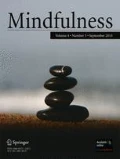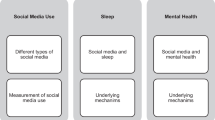Abstract
Mindfulness-based interventions (MBI) have been shown to improve sleep quality among people with insomnia. However, much less is known about the effects of MBIs on other aspects of insomnia such as daytime symptoms and cognitive-emotional arousal. The purpose of this study was to examine the treatment effects on these domains for adults with chronic insomnia disorder who were randomized to mindfulness-based stress reduction (MBSR), mindfulness-based therapy for insomnia (MBTI), or a delayed-treatment control consisting of sleep diary self-monitoring (SM) followed by behavior therapy (BT). Analyses were conducted on baseline to post-treatment changes with superiority comparisons for each MBI to SM followed by non-inferiority comparisons for each MBI to BT. The results revealed significant reductions from baseline in the MBTI group with large effect sizes on sleep effort, maladaptive sleep-related cognitions, and hyperarousal which were superior to the SM control (p < 0.05) and non-inferior to BT (p < 0.025). MBSR demonstrated a significant increase in positive affect with a large effect size which was non-inferior to BT (p < 0.025) but not statistically significant compared to SM. These findings indicate that MBTI, a new MBI which combines mindfulness practices with behavioral sleep components, can be effective at reducing cognitive-emotional arousal related to insomnia while MBSR, a general MBI, can increase positive affect at a level similar to a standard behavioral treatment for insomnia.


Similar content being viewed by others
References
American Academy of Sleep Medicine. (2005). The International Classification of Sleep Disorders-2. Rochester, MN.
American Psychatric Association. (2013). Diagnostic and statistical manual of mental disorders: DSM-5. Washington, D.C.: American Psychiatric Association.
Beck, A. T., Steer, R. A., & Brown, G. K. (1996). Manual for the beck depression inventory-II. San Antonio: Psychological Corporation.
Black, D. S., O'Reilly, G. A., Olmstead, R., Breen, E. C., & Irwin, M. R. (2015). Mindfulness meditation and improvement in sleep quality and daytime impairment among older adults with sleep disturbances: a randomized clinical trial. JAMA Internal Medicine, 175(4), 494–501.
Bootzin, R. R. (1972). Stimulus control treatment for insomnia. Paper presented at the 80th Annual Convention of the American Psychological Association.
Broomfield, N. M., & Espie, C. A. (2005). Towards a valid, reliable measure of sleep effort. Journal Sleep Research, 14(4), 401–407.
Buysse, D. J., Ancoli-Israel, S., Edinger, J. D., Lichstein, K. L., & Morin, C. M. (2006). Recommendations for a standard research assessment of insomnia. Sleep, 29(9), 1155–1173.
Carney, C. E., Edinger, J. D., Morin, C. M., Manber, R., Rybarczyk, B., Stepanski, E. J.,. .. Lack, L. (2010). Examining maladaptive beliefs about sleep across insomnia patient groups. Journal of Psychosomatic Research, 68(1), 57–65.
Edinger, J. D., Wohlgemuth, W. K., Radtke, R. A., Marsh, G. R., & Quillian, R. E. (2001). Does cognitive-behavioral insomnia therapy alter dysfunctional beliefs about sleep? Sleep, 24(5), 591–599.
Edinger, J. D., Bonnet, M. H., Bootzin, R. R., Doghramji, K., Dorsey, C. M., Espie, C. A.,. .. American Academy of Sleep Medicine Work, G (2004). Derivation of research diagnostic criteria for insomnia: report of an American Academy of Sleep Medicine Work Group. Sleep, 27(8), 1567–1596.
Edinger, J. D., Wyatt, J. K., Stepanski, E. J., Olsen, M. K., Stechuchak, K. M., Carney, C. E.,. .. Krystal, A. D. (2011). Testing the reliability and validity of DSM-IV-TR and ICSD-2 insomnia diagnoses. Results of a multitrait-multimethod analysis. Archives of General Psychiatry, 68(10), 992–1002.
Edinger, J. D., Buysse, D. J., Deriy, L., Germain, A., Lewin, D. S., Ong, J. C., & Morgenthaler, T. I. (2015). Quality measures for the care of patients with insomnia. Journal of Clinical Sleep Medicine, 11(3), 311–334.
Espie, C. A., Inglis, S. J., Tessier, S., & Harvey, L. (2001). The clinical effectiveness of cognitive behaviour therapy for chronic insomnia: implementation and evaluation of a sleep clinic in general medical practice. Behaviour Research and Therapy, 39(1), 45–60.
Espie, C. A., Kyle, S. D., Williams, C., Ong, J. C., Douglas, N. J., Hames, P., & Brown, J. S. (2012). A randomized, placebo-controlled trial of online cognitive behavioral therapy for chronic insomnia disorder delivered via an automated media-rich web application. Sleep, 35(6), 769–781.
Garland, S. N., Carlson, L. E., Stephens, A. J., Antle, M. C., Samuels, C., & Campbell, T. S. (2014). Mindfulness-based stress reduction compared with cognitive behavioral therapy for the treatment of insomnia comorbid with cancer: a randomized, partially blinded, noninferiority trial. Journal of Clinical Oncology, 32(5), 449–457.
Gross, C. R., Kreitzer, M. J., Reilly-Spong, M., Wall, M., Winbush, N. Y., Patterson, R.,. .. Cramer-Bornemann, M. (2011). Mindfulness-based stress reduction versus pharmacotherapy for chronic primary insomnia: a randomized controlled clinical trial. Explore, 7(2), 76–87.
Hauri, P. J. (1977). Current concepts: the sleep disorders. Kalamazoo: The Upjohn Company.
Jacobson, N. S., & Truax, P. (1991). Clinical significance: a statistical approach to defining meaningful change in psychotherapy research. Journal of Consulting and Clinical Psychology, 59(1), 12–19.
Johns, M. W. (1991). A new method for measuring daytime sleepiness: the Epworth Sleepiness Scale. Sleep, 14(6), 540–545.
Kabat-Zinn, J. (1990). Full catastrophe living: Using the wisdom of your body and mind to face stress, pain, and illness. New York: Delacorte Press.
Krupp, L. B., LaRocca, N. G., Muir-Nash, J., & Steinberg, A. D. (1989). The fatigue severity scale. Application to patients with multiple sclerosis and systemic lupus erythematosus. Archives of Neurology, 46(10), 1121–1123.
Krystal, A. D. (2007). Treating the health, quality of life, and functional impairments in insomnia. Journal of Clinical Sleep Medicine, 3(1), 63–72.
Morgenthaler, T., Kramer, M., Alessi, C., Friedman, L., Boehlecke, B., Brown, T.,. .. Swick, T. (2006). Practice parameters for the psychological and behavioral treatment of insomnia: an update. An American Academy of Sleep Medicine Report. Sleep, 29(11), 1415–1419.
Morin, C. M. (1993). Insomnia: psychological assessment and management. New York: The Guilford Press.
Morin, C. M., Blais, F., & Savard, J. (2002). Are changes in beliefs and attitudes about sleep related to sleep improvements in the treatment of insomnia? Behaviour Research and Therapy, 40(7), 741–752.
Morin, C. M., LeBlanc, M., Belanger, L., Ivers, H., Merette, C., & Savard, J. (2011). Prevalence of insomnia and its treatment in Canada. The Canadian Journal of Psychiatry / La Revue canadienne de psychiatrie, 56(9).
Nicassio, P. M., Mendlowitz, D. R., Fussell, J. J., & Petras, L. (1985). The phenomenology of the pre-sleep state: the development of the pre-sleep arousal scale. Behaviour Research and Therapy, 23(3), 263–271.
Ohayon, M. M. (2002). Epidemiology of insomnia: what we know and what we still need to learn. Sleep Medicine Reviews, 6(2), 97–111.
Ong, J. C. (2017). Mindfulness-based therapy for insomnia. Washington, DC: American Psychological Association.
Ong, J. C., & Sholtes, D. (2010). A mindfulness-based approach to the treatment of insomnia. Journal of Clinical Psychology, 66(11), 1175–1184.
Ong, J. C., & Smith, C. E. (2017). Using mindfulness for the treatment of insomnia. Current Sleep Medicine Reports, 3, 57–65.
Ong, J. C., Shapiro, S. L., & Manber, R. (2008). Combining mindfulness meditation with cognitive-behavior therapy for insomnia: a treatment-development study. Behavior Therapy, 39(2), 171–182.
Ong, J. C., Shapiro, S. L., & Manber, R. (2009). Mindfulness meditation and cognitive behavioral therapy for insomnia: a naturalistic 12-month follow-up. Explore, 5(1), 30–36.
Ong, J. C., Ulmer, C. S., & Manber, R. (2012). Improving sleep with mindfulness and acceptance: a metacognitive model of insomnia. Behaviour Research and Therapy, 50(11), 651–660.
Ong, J. C., Manber, R., Segal, Z., Xia, Y., Shapiro, S., & Wyatt, J. K. (2014). A randomized controlled trial of mindfulness meditation for chronic insomnia. Sleep, 37(9), 1553–1563.
Palagini, L., Ong, J. C., & Riemann, D. (2017). The mediating role of sleep-related metacognitive processes in trait and pre-sleep state hyperarousal in insomnia disorder. Journal of Psychosomatic Research, 99, 59–65.
Pavlova, M., Berg, O., Gleason, R., Walker, F., Roberts, S., & Regestein, Q. (2001). Self-reported hyperarousal traits among insomnia patients. Journal of Psychosomatic Research, 51(2), 435–441.
Perlis, M., Jungquist, C., Smith, M., & Posner, P. (2005). Cognitive behavioral treatment of insomnia: a session-by-session guide. New York: Springer.
Regestein, Q., Pavlova, M., & Casares, F. (1996). Validation of the hyperarousal scale in primary insomnia subjects. Sleep Research, 25, 344.
Riemann, D., Spiegelhalder, K., Feige, B., Voderholzer, U., Berger, M., Perlis, M., & Nissen, C. (2010). The hyperarousal model of insomnia: a review of the concept and its evidence. Sleep Medicine Reviews, 14(1), 19–31.
Schumi, J., & Wittes, J. T. (2011). Through the looking glass: understanding non-inferiority. Trials, 12, 106. https://doi.org/10.1186/1745-6215-12-106.
Spielberger, C. D., Gorsuch, R. L., Lushene, R., Vagg, P. R., & Jacobs, G. A. (1983). Manual for the State-Trait Anxiety Inventory. Palo Alto, CA: Consulting Psychologists Press.
Spielman, A. J., Saskin, P., & Thorpy, M. J. (1987). Treatment of chronic insomnia by restriction of time in bed. Sleep, 10(1), 45–56.
Stepanski, E., Koshorek, G., Zorick, F., Glinn, M., Roehrs, T., & Roth, T. (1989). Characteristics of individuals who do or do not seek treatment for chronic insomnia. Psychosomatics, 30(4), 421–427.
Tang, Y.-Y., Tang, R., & Posner, M. I. (2016). Mindfulness meditation improves emotion regulation and reduces drug abuse. Drug and Alcohol Dependence, 163, S13–S18.
Valko, P. O., Bassetti, C. L., Bloch, K. E., Held, U., & Baumann, C. R. (2008). Validation of the fatigue severity scale in a Swiss cohort. Sleep, 31(11), 1601–1607.
Waine, J., Broomfield, N. M., Banham, S., & Espie, C. A. (2009). Metacognitive beliefs in primary insomnia: developing and validating the Metacognitions Questionnaire–Insomnia (MCQ-I). Journal of Behavior Therapy and Experimental Psychiatry, 40(1), 15–23.
Watson, D., Clark, L. A., & Tellegen, A. (1988). Development and validation of brief measures of positive and negative affect: the PANAS scales. Journal of Personality and Social Psychology, 54(6), 1063–1070.
Zhang, J. X., Liu, X. H., Xie, X. H., Zhao, D., Shan, M. S., Zhang, X. L.,. .. Cui, H. (2015). Mindfulness-based stress reduction for chronic insomnia in adults older than 75 years: a randomized, controlled, single-blind clinical trial. Explore, 11(3), 180–185.
Acknowledgements
The authors would like to thank Shauna Shapiro, Zindel Segal, M. Isabel Crisostomo, and James Wyatt for the consultation and input in the development and design of the study. We would also like to thank David Sholtes and Christina Khou for their contributions as study coordinators, and Arthur Hoffman, Vered Hankin, Jamie Cvengros, Megan Hood, Jamie Jackson, Heather Gunn, and Liisa Hantsoo for serving as study therapists.
Funding
This study was funded by a grant from the National Institutes of Health, National Center for Complementary and Alternative Medicine, awarded to the first author (K23AT003678). The content is solely the responsibility of the authors and does not necessarily represent the official views of the National Institutes of Health.
Author information
Authors and Affiliations
Contributions
JCO: designed and executed the study, assisted with the data analyses, and wrote the paper. YX: conducted data analyses and collaborated in the writing and editing of the paper. CES: collaborated in the writing and editing of the final manuscript. RM: collaborated with the design and writing of the study, and collaborated in the writing and editing of the final manuscript.
Corresponding author
Ethics declarations
Conflict of Interests
Dr. Ong receives royalties from APA Books. This activity is unrelated to this manuscript. Dr. Xia, Dr. Manber, and Christine Smith declare that they have no conflict of interest.
Ethical Approval
All procedures performed in studies involved in human participants were in accordance with the ethical standards of the institutional and/or national research committee and with the 1964 Helsinki declaration and its later amendments or comparable ethical standards. This study is registered in clinicaltrials.gov, identifier NCT00768781, Mindfulness-Based Approaches to Insomnia.
Informed Consent
Informed consent was obtained from all individual participants included in the study.
Electronic Supplementary Material
ESM 1
(DOCX 30 kb).
Rights and permissions
About this article
Cite this article
Ong, J.C., Xia, Y., Smith-Mason, C.E. et al. A Randomized Controlled Trial of Mindfulness Meditation for Chronic Insomnia: Effects on Daytime Symptoms and Cognitive-Emotional Arousal. Mindfulness 9, 1702–1712 (2018). https://doi.org/10.1007/s12671-018-0911-6
Published:
Issue Date:
DOI: https://doi.org/10.1007/s12671-018-0911-6



